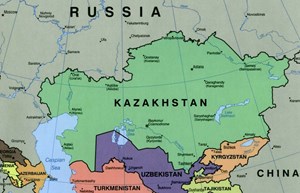(Bloomberg) – Kazakhstan is preparing to channel some of its national wealth into artificial intelligence infrastructure, joining a global rush where venture capital firms and energy-rich states are betting billions on the sector despite volatility and surging valuations.

The National Investment Corp., a unit of the Kazakh central bank that manages part of the country’s $60 billion oil fund, sees data centers and other AI architecture as a path to stronger returns in a challenging environment, CEO Serikzhan Rysbekov said in an interview at the firm’s headquarters in Astana.
This year, the NIC, which manages $3.4 billion, plans its first capital allocations into infrastructure funds that include investments in AI facilities, Rysbekov, 40, said.
The move by Kazakhstan, Central Asia’s largest oil producer, is the latest example of the AI boom reshaping national investment priorities. In the Middle East, Saudi Arabia, the United Arab Emirates and Qatar are deploying billions of dollars to back firms like OpenAI, build data centers or secure chip supplies.
The move isn’t without risks. Big tech companies are throwing money at AI, but it’s still unclear when those investments will pay off.
The country’s embrace of AI isn’t limited to finance either. State-run Kazakhtelecom has separately launched an initiative to support the local build out of local AI infrastructure in partnership with Nvidia.
AI also has made venture capital more attractive, Rysbekov said.
“We declined to invest in venture capital in 2021,” he said, citing inflated valuations. “Now the development of AI is going on, we see this as an attractive investment, and expect the market to grow.”
The company plans to choose one or two venture capital funds and place about $50 million in each, he said.
Separately, the Astana-based company also intends to increase the share of investments in secondary funds and private credit funds, Rysbekov said. This year, the company is looking to decide on two or three funds representing each vehicle type, investing roughly $50 million in each, he said.
“We plan to diversify the different asset classes in our portfolio,” and in the medium-term, anticipate specialized mandates focused on geography and various industries, Rysbekov said.
GCM Grosvenor, which invests some of the Kazakh firm’s money into hedge funds, will advise the central bank unit on investments into infrastructure funds, Rysbekov said. He said the firm was discussing a possible strategy of taking core positions in funds run by global managers. “For example, one in the US, one in Europe and one in Asia, and then gradually building a portfolio around them.”
NIC is also considering investing in U.S. hedge funds that use quantitative models to buy stocks, he said.
Rysbekov said his group has observed some changes in managers’ behavior amid a global, private equity cash crunch. That’s included discounts for investing early and offers of additional services like consultations.
So far, the firm has invested more than 50% of its assets in private equity funds, about 20% in hedge funds, and the rest diversified between bonds, real estate and private debt, the latter being a newcomer to the firm’s portfolio. Roughly one third of the investments are handled by external managers, with the remainder managed directly by the investment unit.
Right now, the firm’s assets under management consist of an even split between the central bank’s reserves and holdings from the oil fund.
The NIC has currently allocated roughly 3% of the assets in the national oil fund’s saving portfolio, but it’s allowed to invest as much as 5% — a cap it hopes is raised amid the hunt for new profit opportunities, Rysbekov said.
“We have a lot of plans,” he said.

